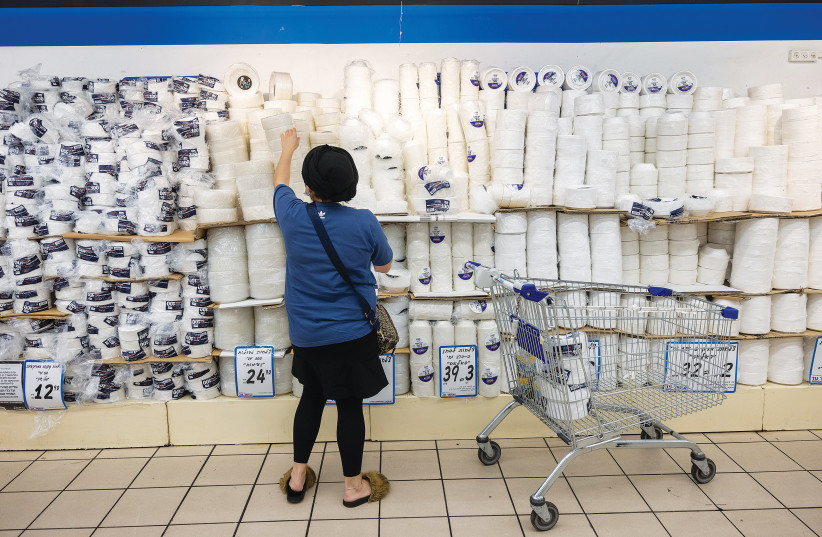Israel must make eco-friendly utensils cheaper than plastic disposables - opinion

The tax on plastic products made life difficult for large families and institutions, but reducing the cost of ecological alternative products could work better.
The new government’s decision to cancel the sales tax on single-use plastic tableware was bad news for anyone who cares about the environment. This week, we are calling on the government to redress the inequality of import tariffs to make biodegradable plates, cups and silverware more affordable than plastic disposable products.
Currently, single-use plastic imports are not taxed but Israel’s customs officers impose import tariffs of up to 20% on biodegradable alternative items. These rules are now under review, with new tariff announcements due February 15. In order to rescue the Israeli environment from the plague of plastic waste, we need to tax harmful products more, and eco-friendly products less. Changing these import duty rules would reduce the price of biodegradable products and encourage consumers to end their dependency on single-use plastic.
In 2021, Israeli consumption of disposable plastic utensils was five times the average of Europe. Political pressure recently forced the new government to cancel the extra sales tax on single-use plastic tableware, introduced in November 2021, and the new Environmental Protection Minister Idit Silman is reportedly looking for new ways to reduce our dependency on disposables.
Single-use plastics are bad, so making eco-friendly disposables cheaper would be better for everyone
Single-use plastics not only waste the world’s resources and fill up our landfill facilities, but they also litter our parks, beaches and nature trails. Before they were taxed, they made up an estimated 90% of the trash collected on Israel’s beaches, representing a major environmental threat to the ecology of our coastline, as well as an ugly nuisance.
There are now wonderful biodegradable and compostable alternatives to plastic that return to nature after use. They are manufactured in Asia from sugar-cane fiber – a renewable byproduct of the food industry. They are currently more expensive than comparable plastic items, with up to 20% of their cost comprised of import duties that do not apply to plastics. Canceling these import tariffs on eco-friendly disposables would make them cheaper than plastic ones!
We know that many people in Israel want to become eco-friendly consumers. During the year that the tax on disposables was in force, environmental groups say that single-use plastic consumption dropped by a third. Children and young people are urging their parents and grandparents to stop wasting the world’s resources, to end our dependency on oil-based plastics, and to stop burying toxic plastic waste in our precious earth.
The demand for biodegradable alternatives to single-use plastics is growing, and the government should encourage this positive trend. Removing import tariffs on selected items is a great way to encourage consumers to vote with their purses.
By making biodegradable disposable products more affordable, the finance minister could demonstrate the Israeli government’s commitment to protecting the environment. A further step would be to invest in local manufacturing businesses to produce eco-friendly plates and cups for the Israeli market – creating jobs and eliminating the need to ship products from Asia.
We accept that the tax on plastic products made life difficult for large families and institutions, but reducing the cost of ecological alternative products could work better than the tax. It would enable more consumers to end their dependency on plastic and start using biodegradables that do not harm our fragile ecology.
So Bezalel Smotrich, as you draw up your list of import tariffs, we urge you to cancel the import duties on biodegradable tableware. Then we can all benefit from the reduced prices and reduce our dependency on single-use plastics.
The writer is CEO of Source One Eco Friendly, supplying biodegradable tableware products to consumers and businesses in Israel.
Jerusalem Post Store
`; document.getElementById("linkPremium").innerHTML = cont; var divWithLink = document.getElementById("premium-link"); if (divWithLink !== null && divWithLink !== 'undefined') { divWithLink.style.border = "solid 1px #cb0f3e"; divWithLink.style.textAlign = "center"; divWithLink.style.marginBottom = "15px"; divWithLink.style.marginTop = "15px"; divWithLink.style.width = "100%"; divWithLink.style.backgroundColor = "#122952"; divWithLink.style.color = "#ffffff"; divWithLink.style.lineHeight = "1.5"; } } (function (v, i) { });

